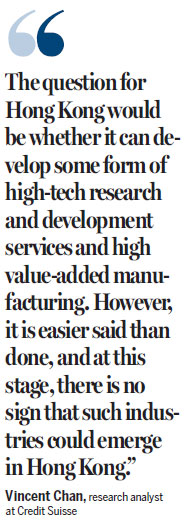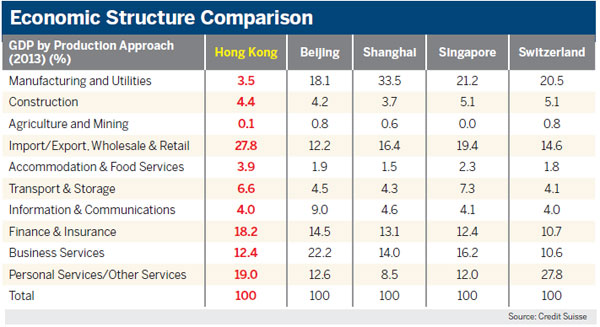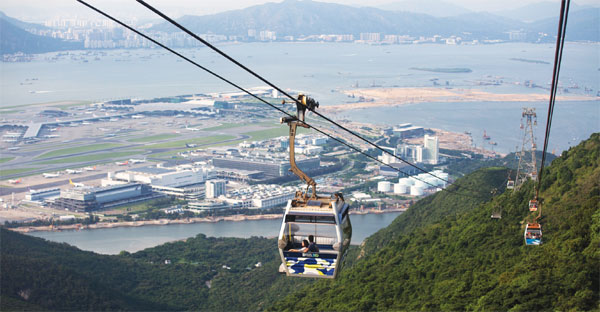HK may see downturn this year
Updated: 2015-03-24 10:22
By Oswald Chan in Hong Kong(HK Edition)
|
|||||||||
Report warns SAR too reliant on 'skewed economy' as tourists skip city
Hong Kong will suffer an economic downturn this year as the city's "unbalanced, troubled and hollowed-out economy" will be heavily susceptible to a structural decline in the number of mainland tourists, analysts have warned.
They say it will probably take years to reform such a skewed economic structure.
In the past 10 years, the economic picture has made the city ever more dependent on the financial sector and mainland inbound tourism for economic growth, according to Swiss investment bank Credit Suisse's latest strategy report.
The report compared Hong Kong to the economies in Beijing, Shanghai, Singapore and Switzerland, noting that manufacturing and utilities only accounted for 3.5 percent of gross domestic product (GDP), the lowest among those studied.
In contrast, the finance and insurance sector contributed 18.2 percent of the SAR's GDP, import and export, wholesale and retail, 27.8 percent, and accommodation and food services made up 3.9 percent of GDP, figures that are all higher than the comparative economies.
Troubles loom when mainland inbound tourism is expected to decline this year, the report warned, due to the subdued mainland economy, the anti-corruption campaign that has curtailed demand for luxury goods, and Hong Kong losing out to other tourist destinations.
The number of mainland tour groups to the SAR dived by 30 percent in February compared with the same month last year, while that for the first 10 days in March plunged by 60 percent.
Weakening mainland tourism growth is taking a toll on the city's retail sales and retail property-rental market. Hong Kong's retail sales in January plunged 14.6 percent in value from a year earlier, the biggest drop since the 2003 SARS outbreak with prompted the launch of the Individual Visit Scheme to lure more mainland tourists to the city.
Forrest Chan, an equity analyst at CCB International, said the city's mass market retailers will be affected most by a possible move to tighten the visa policy, while the upscale retail segment is vulnerable to rapidly growing competition from other international tourist destinations. "Political or policy risks have become a major factor in Hong Kong's retail market," he said.
The Credit Suisse report predicted that rentals for street-level stores in prime shopping districts will drop by an average 20 percent in 2015 due to lack of flexibility to change tenants and a high comparison base in previous years.
The report estimated Hong Kong economic growth will slow to 1.6 percent this year, which is at the low end of the range projected earlier by the Hong Kong government.
The falling number of mainland visitors and declining retail sales and street store rentals are the economic headwinds the city is confronting. The problem is compounded by gradual normalization of US interest rates and lackluster export growth.
The US Federal Reserve has dropped its pledge to be "patient" before raising interest rates. An increase in bank interest rates would have a profound impact on the property market, economists said.
"Hong Kong's economy would have its share of rainy days over the next financial year," Financial Secretary John Tsang Chun-wah warned in March.
The struggling export sector, due to the feeble economies in the euro zone and Japan, is also poised to hinder Hong Kong's economic growth this year.
Hong Kong's export growth rose by 2.8 percent in January due to a rebound in exports to the mainland, but the government said the performance of the developed markets was generally weak.
"While consumer spending finished 2014 on a strong note, the same cannot be said for exports, which appear to have weakened in the fourth quarter last year," Hang Seng Bank senior economist Ryan Lam Chun-wang said.
"The question for Hong Kong would be whether it can develop some form of high-tech research and development services and high value-added manufacturing. However, it is easier said than done, and at this stage, there is no sign that such industries could emerge in Hong Kong," said Vincent Chan, a research analyst at Credit Suisse.
"It will be a tough task for the Hong Kong economy in this transition, and it will take years to create a more balanced economy," Chan warned. "Without a strong domestic political consensus, it will become much more difficult."
oswald@chinadailyhk.com


|
The city's upscale retail segment is vulnerable to rapidly growing competition from other international tourist destinations, while a weak domestic consensus may prevent the city from embracing the high-tech industry to balance its economy. Brent Lewin / Bloomberg |
(HK Edition 03/24/2015 page11)
